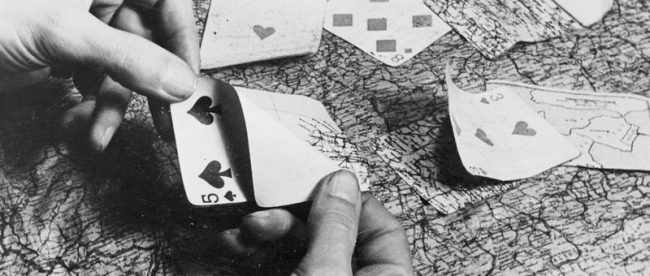War Games


For Allied POWs, this minor bit of hospitality was more than welcome — for some, it was also a ticket to freedom.
The United States government worked every angle to try to get its soldiers home. And the Germans’ allowance for some playing cards and the like gave the U.S. some interesting opportunities. The government, partnering with the United States Playing Card Company, developed a special type of Bicycle-brand playing cards. Those cards, some seen above, held escape maps within them, printed directly on the card. As recounted by the company’s official website, when moistened, the cards’ glue — a special type of glue used for this purpose — would weaken. The cards’ faces would peel away, leaving nothing but detailed escape plans behind.
The United Kingdom pulled off a similar trick. In 1941, British intelligence worked with John Waddington Ltd., the UK company licensed to make Monopoly games, to make a special version of the classic board game. According to Mental_Floss magazine, these sets came with a cornucopia of clandestine goodies. Maps, printed on silk to avoid destruction by weather, were hidden within the box. The games also included metal files and magnetic compasses to facilitate an escape. And included beneath the Monopoly money was real money — French, German, and Italian notes were among the fake bills.
While these board games would be collectors’ items today, unfortunately, finding one would be a trick all to itself. All of the spy-enhanced Monopoly sets were destroyed after the war, according to ABC News.
Bonus fact: Also from the Bicycle website: Playing cards had a role in the Vietnam War as well. The Viet Cong were apparently superstitious and fearful of the Ace of Spades, which was previously used by French fortunetellers in the area to signify death. American commanders requested decks full of only the Ace of Spades and Bicycle, of course, provided them (for free). American troops left the cards in strategic places, and some Viet Cong would flee upon seeing what they believed to be a bad omen.
From the Archives: Shuffled: Go shuffle a deck. The order you just created probably never existed before. Ever.
Related: A Svengali deck of playing cards, specifically designed to allow novice users to perform magic tricks. Four stars on 15 reviews. If you’re interested, you may also want to pick up this book of 101 tricks one can perform with a Svengali deck.

Leave a comment